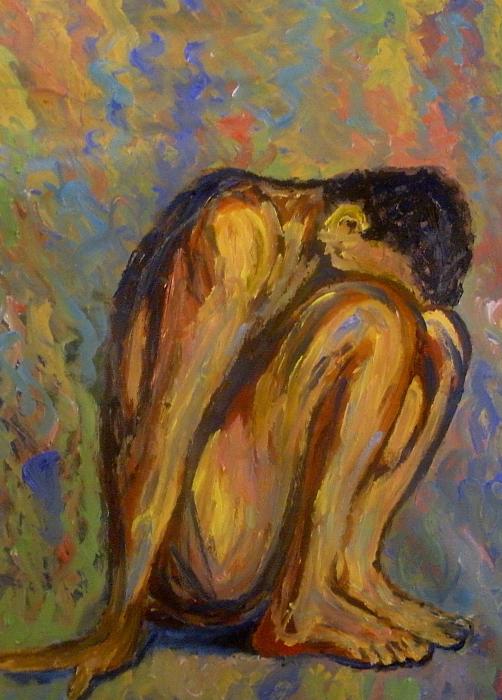 Repost from January 2015,
Repost from January 2015,  kindness
kindness  Tuesday, June 28, 2016 at 07:37AM
Tuesday, June 28, 2016 at 07:37AM  Last year I saw a real dancer dance. I sat just ten feet away and watched: I marveled at the motion. His leaps seemed effortless; his steps flowed like water; his hand opened a pathway through which his arm, his shoulder, his torso, and his legs followed. As I watched, the music melted away and I beheld motion, pure motion, become a paintbrush. Air was his canvas; the painting vanished after each step, yielding straightaway to another. When the dance ended, I was left with a memory of the painting. Months later, the memory remains.
Last year I saw a real dancer dance. I sat just ten feet away and watched: I marveled at the motion. His leaps seemed effortless; his steps flowed like water; his hand opened a pathway through which his arm, his shoulder, his torso, and his legs followed. As I watched, the music melted away and I beheld motion, pure motion, become a paintbrush. Air was his canvas; the painting vanished after each step, yielding straightaway to another. When the dance ended, I was left with a memory of the painting. Months later, the memory remains.
Nor is the memory about the dancer, but rather the dance. Although the dance did not exist apart from the dancer, he and the motion were indistinguishable. He disappeared in the dance.
The single word for this description is “graceful.” Yet such grace was anything but natural: this grace came as the result of years of discipline, practice, effort and sacrifice. The dancer, I’m sure, had fallen and suffered injury again and again. Certainly he had struggled with doubt, embarrassment, pain, fear, awkwardness, and discouragement. What emerged from the studio was a kind of resurrection, a resurrection of grace and beauty.
Grace grew from effort and focus. His motion inspired others. His art gave glory to God, and while it had the look of spontaneity it was anything but spur of the moment. Such grace grew from devotion: love of craft and creator.
I saw grace in motion, and my idea of grace deepened and grew. What he had done in the natural, I began to desire in the Spirit. What does grace look like in everyday life? No dictionary can tell the tale; no theologian can describe the beauty: we must see it firsthand—but look sharp, this kind of grace disappears as quickly as it comes.
What if grace dances all around us? What do you suppose such gracefulness looks like in our relationships with others? And in what studio do we learn the dance of divine love?
 Monday, August 20, 2012 at 12:03AM
Monday, August 20, 2012 at 12:03AM  I’ve decided to do a bit of griping today—but only for one paragraph. Be warned. Here it comes.
I’ve decided to do a bit of griping today—but only for one paragraph. Be warned. Here it comes.
The blogosphere is filled with criticism, finger pointing and name-calling between family members. A famous Christian minister says something stupid (and it was stupid) and before you can say “trending topic” he is pummeled by criticism from others within the faith. Someone is hurt by their mistreatment at a local church, so they adopt Lone Ranger status and start a new blog about how the “real” church has nothing to do with organized religion. One faction of believers promotes an opinion and, in response, another faction labels them heretical or dangerous. It’s Jersey Shore for believers, only uglier.
There. I vented for one paragraph. But—no surprise—I don’t feel any better, nor have I changed anyone’s opinion or behavior. We all remain the same.
There’s a more excellent way. In my frustration, I reach for an island of transcendent sanity. I turn the pages until I read: “The end of all things is near. Therefore be alert and of sober mind so that you may pray. Above all, love each other deeply, because love covers over a multitude of sins. Offer hospitality to one another without grumbling. Each of you should use whatever gift you have received to serve others, as faithful stewards of God’s grace in its various forms.” (1 Peter 4:7-10)
One phrase shines through the layers of meaning in Peter’s words: “love covers over a multitude of sins.” He is talking about a community of people who gave received the great treasure of God’s grace and are called upon to steward that treasure by how they treat one another. This stewardship includes the kind of love capable of protecting others from themselves: love refuses to reveal the sinfulness of others. To publicly expose the sins of others indicates a lack of love.
Who will help me? In my shameful state I need a love that throws a garment over of my ugly nakedness—the nakedness I have put on display by my selfish, egotistical, controlling words and choices toward others. Who will protect me if not the members of my own family?
This week’s meditation is a quiet reflection and openness toward the Holy Spirit. He can help us explore the depth of our love toward others. We can simply ask him: Does my love cover other's sin?
There's a difference between excusing sin and covering it. Can I hold people—especially members of God’s family--accountable without exposing them?
Our call to steward God’s grace goes beyond our personal relationships and extends to everyone with whom the Father has a personal relationship. It means we learn to love others for simply no other reason than that the Father loves them. It means loving all the church. When I rail against the sins of the church I am simply demonstrating my lack of love for her.
We are each given a stewardship of grace. We can be like the man who foolishly held his one talent and chose not to multiply it. We can keep God’s grace to ourselves, or multiply God’s grace by extending it to others.